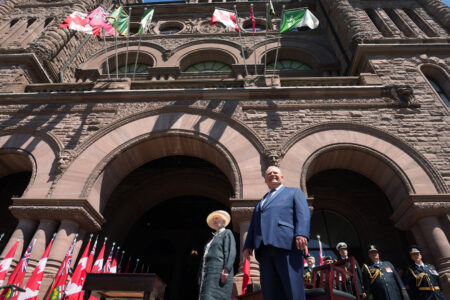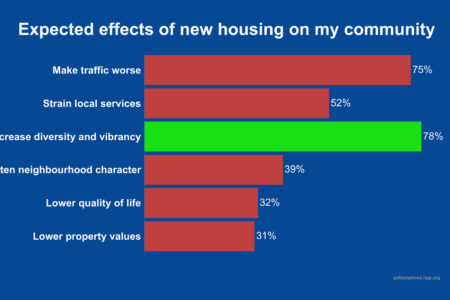
On January 11, 2017, David Moscrop told us that we need to understand “how different people see the world,” in order to “combat” populism (notwithstanding that such combat undermines small-d democratic and small-r republican will). He says that politicians make policy based on facts of two stripes, black and white — although, of course, facts are either facts or they are not. Most politicians do not make policy based on facts (although they may tell us they do) but on their opinions, possibly coloured by their interpretation of facts, as Moscrop alludes to when he talks about “messaging” related to facts. In reality, only scientists do things based on facts, and philosopher Karl Popper taught us that even scientists should be careful what they assert based on learning; science only progresses in the negative (disproving a theory) not the positive (one cannot really prove anything; it just means one hasn’t found the experiment that disproves it yet).
My point is that popular perception is based on sufficient reality, and reality is assessed by the people based on deeper values and beliefs, not manipulation. While Moscrop attempts to find populism dangerous, the real danger is actually to the socialist, not civilization.
There is no “cynical manipulation” behind populist movements, or we are dismissing the opinions of the population as mere rabble lacking intelligence.
Some politicians possess a unique skill: the ability to sense popular will on a marginal or transactional basis, rather than on the basis of the holistic and overarching terms that academics use (and that Moscrop utilized in his piece). In other words, politicians interpret popular will based on the last job lost, the last shop closed and the last terrorist incident. This sufficient reality is what underlies popular opinion as to what is good, fair or just and what a market entails. Thus, popular perceptions are rooted in that social reality: jobs lost, shops closed and people killed. There is no “cynical manipulation” behind populist movements, or we are dismissing the opinions of the population as mere rabble lacking intelligence. The manipulation occurred when they lost their jobs or saw someone killed and became fearful as a result.
These incidents are not illusory – they are real. How we react to these incidents may eventually end up in a discussion of holistic or overarching ideas, but we first have to pause and reflect to understand the foundations of populism.
Moscrop tells us that truth is about what is, as in ontology, and how we know, as in epistemology. In fact, epistemology is based on three constructs – taxonomy (essentially words, grunts, gestures, etc., with some denotation), ontology (the nature of being, which is essentially putting words and concepts into a context of useful meaning) and, most importantly, axiology (values, cultures, and beliefs). Axiology is where truth is determined, and it is based on deeper values and culture, not populist manipulation. The demagogue cannot raise what is not already there – we are fearful because we understand the importance of a job, to our well-being; of the economic structure of our towns, no matter how small; and the preservation of our families’ security. The creation of an echo chamber on Facebook or Twitter is not the problem, nor is the election of someone like Donald Trump – the fears are real, not transient, and they are based in reality, not illusion.
So, what are the solutions? Black and white “facts” are breaking down along two distinct lines these days – the left-leaning, essentially socialist, line, and the right-leaning, Constitution-based line, based on maximizing economic value. What we know from economist and philosopher F.A. Hayek is that, according to empirical reality (that is, real facts, not interpreted “messaging”), socialist regimes and constructs have failed through history and will always fail. To see this, we only have to look at Germany from the mid-19th century through the Second World War, early 20th century Italy and Russia, the Soviet Union, and even early 20th century England (as discussed in Hayek’s The Road to Serfdom), as well as many democratic-socialist countries today (including most of the EU and too much of the US). This is because these regimes require coercion and minimize innovation and creativity — which is anathema to the progress of civilization and causes stagnation and ultimately totalitarianism, as central planning wipes out free thought of any kind.
When democratic populists insist we should just care, raise wages, supply health care for free and everything else, realists clearly understand the deadly implications of all that, and they resist it. For example, all too often innovation in health care does not take place in those countries with national health care but in economically free countries where legitimate profit from those enterprises can be obtained. The United States’ attempt at national health care, the Affordable Care Act, is an example of truly Orwellian doublespeak — providing unaffordable (and diminishing) health care, as the “markets” created by the act are untenable and failing. And yet, people are being subjected to extreme coercion to get this unaffordable and failing “insurance.” The fact that the democratic populists (that is, socialists) insist (by denying empirical reality and history) that we as global citizens do not see the reality of their philosophy, means that perception is now clouded by academic and political dishonesty. That is not a sound foundation for rational debate.
The perceptions behind populism – marginal jobs and towns lost, and people killed, are real. Today’s neoliberals and quasiliberals need to agree that the solutions must be based on what Hayek taught us, or the solutions will become final, as in terminal, for society, politics, perception and, indeed, civilization. Instead, we are fighting a veiled danger – socialists hide the reality of their policies, while more jobs are lost and more lives are lost to terrorism. The populist tears away the veil, and this is not dangerous, except to the socialists. Until it can be agreed that, as a premier example for the world, the US Constitution (in its original form and interpretation) must again be at the foundation of US society, and its originalist tenets can be applied more globally, we will constantly fight to tear away this veil. The real marginalization is being created by those who keep putting this veil back into place, not the populists who are fighting to tear it away.
Photo: A Boeing employee holds a sign before US President Donald J. Trump speaks on the debut of the Boeing 787-10 Dreamliner at the Boeing South Carolina faculty in North Charleston, South Carolina, USA, 17 February 2017. EPA/STEPHEN B. MORTON
Do you have something to say about the article you just read? Be part of the Policy Options discussion, and send in your own submission. Here is a link on how to do it. | Souhaitez-vous réagir à cet article ? Joignez-vous aux débats d’Options politiques et soumettez-nous votre texte en suivant ces directives.







